Outside of drumming for Slow Hollows and Current Joys, Jackson Katz is an impassioned, fervent presence when performing under his Brutus VIII moniker. You wouldn’t guess that from his well-mannered and soft-spoken demeanor, but Katz’s performances with the electroclash and darkwave project are intense and cathartic. Originally from Los Angeles, he then moved to New York to sharpen his captivating live act and on-stage persona. Through hard work in the city’s booming underground, Katz has cultivated a growing following.
Katz’s new album for Danger Collective, PURE GLUTTONY, is maximalist compared to his prior two full-lengths. It’s sonically ambitious—a newfound sense of abrasion permeates every single song. The record opens explosively with bombastic synths—hypnotic and suffocating—and ends on a solemn, pensive note with Katz’s throaty voice cutting through somber strings. The lyrics illustrate the things Katz fears the most. All in all, it is his most gripping body of work. For the first time, it seems like Katz has matched the theatrical, harrowing, and raw live energy of the Brutus show in the studio. Katz told me that he definitely thinks PURE GLUTTONY is his best album so far, and hopes that he can only get better from here.
I spoke at length with Katz about his new record, its musical and literary influences, working extensively with collaborators, and what it’s like to have radically different forms of creative expression.
Compared to your previous two records, A HACKNEY PURSUIT and BEYOND, PURE GLUTTONY sounds a lot more maximalist, propulsive, and intense. Was that a conscious choice?
Jackson Katz: I think so, yeah. With some of the themes of the record and where I was at personally, I wanted to make a much heavier record—just an abrasive, noisier thing. I think also before making this record, I kind of figured out how to do this project live with some friends—Daniel Fox, Nick Noneman, and Dan Vanchieri—they’re in my live band, and as we figured it out, the live show just became more and more aggressive and confrontational. It’s always been that, but I think we’ve figured out what makes us feel good and how to play it. So, we kind of cracked that, and it was time to make this record. I thought, “I’d rather make this record that reflects that show more.” And so, this is kind of the first record I’ve ever done that really encapsulates the live show and the energy of it.
Was it difficult to capture that energy in the studio, then?
JK: I would say a little bit. It has its challenges because I wanna do a lot of big production stuff. I love electronic music and all kinds of music, so I’m not always thinking about how we’re going to do it live. And I mostly play everything with the exception of a couple guests on the record. So, it’s not that it was difficult, but it was definitely at the back of my mind like, “Okay, how are we gonna play this live? Would this make sense in our more aggressive live show?” and stuff like that.
Has the invitation for more collaborations changed the live performance at all, especially with these new batch of songs? There’s definitely lots going on in some of them.
JK: Yeah. I think I don’t really have too many guests that you would hear on the record in the live show. I mean, every once in a while if someone’s around, I’d love to have them be a part of it. But otherwise, not really. I have a few different versions of this live show. There’s a solo version, a two-piece version, a three-piece version, and a four-piece version. And I almost always have my good friend Alena Henke dancing with the shows—she’s always part of the live show, and you can hear her voice on the first track of the record (“Fear Monger”). Sometimes people come in and play a little something for the live show, but it’s not too common.
Given that this record is less no wavey and more of a danceable, dark synthpop affair, were there any specific musical influences you can point to?
JK: Yeah, but less so direct music influences and more so just influences from other forms of art and mediums. I discovered a couple books that really spoke to me, and those two were MAO II by Don DeLillo and LEVIATHAN by Paul Auster. I think they’re sort of in a way companion pieces—those writers knew each other—and I think they were roughly written around the same time. That influenced things a lot, and some movies and other stuff that I was trying to lean into. The music, sound, and stuff… There are a bunch of influences, but a number of those influences are sort of like, these parts of my musical DNA that are always kind of with me, you know? So, it’s not that I was referencing them directly, I was sort of letting myself make what felt natural.
What about your literary influences? Can you distill any of those further? I think it’s interesting taking from readings and books like that with heavy concepts underpinning them to fuel the identity and words of a record like this.
JK: I think I was just moved by not only the stories of those books, but also, like, the actual style of writing. Like, the way DeLillo writes his prose is so poetic in a really beautiful way; I was really struck by it. The thing that struck me about both of those books, is that they’re sort of about domestic terrorism in a way. They’re about these people who are kind of obsessed with the idea of terrorism—they’re not necessarily involving themselves, but they’re kind of fascinated by this idea of what it can do and that sort of thing. Obviously, I don’t necessarily agree with violence or anything. *laughs* I think if anything, I’m so scared of it, especially in the States where there’s so many mass shootings that seem to be happening at random. I’m just truly so scared all the time, to be honest. But I think my diving into those themes and those books is sort of like me confronting those fears in a way. That’s sort of what this record is: writing from the perspective of my fears, if that makes sense. So, even though, again, I really don’t like violence *laughs* and I’m very frightened of it, I felt like this was an interesting exercise to really explore my fears.
What about the lyrics? You paint a lot of vivid pictures with them. Do they come from real-world experience or a stream-of-consciousness?
JK: I’d say it’s a combo of both. Some of it’s stream of consciousness, some of it’s definitely about specific things. When I was writing this [album], also, I was coming out of a break-up, so in a lot of ways it’s a break-up record. It’s kind of like a meditation on loneliness and maybe male loneliness, specifically. As we’ve learned, at least in the States for sure, male loneliness can be kind of toxic and destructive *laughs* so I didn’t go to those dark, dark places. I was like, “Oh shit, these people are scary.” *laughs*
So, to answer your question, yeah, a combo of stream-of-consciousness paired with the more personal and directly related to my life. And other stuff that I just used from my life to grow bigger and write fiction.
Listening to the album in its entirety comes across as a very cathartic release. It almost reads as the Brutus VIII album you’ve always wanted to make. Is that true?
JK: Definitely. I think this band—this project, because it’s mainly me with collaborators—has always been finding its form and that’s how I’ve always wanted it. I’ve always looked at it like a standup comic. You hear about the way that they develop their act and it’s about trying it so many times, and figuring out what works and what doesn’t—that’s how I’ve always seen this. There’s been many different iterations and style changes, I sort of just looked at that as part of this big process. I think this record is the one I always wanted to make—I try to feel that way for every record, to be honest—but definitely when I made it, it was exactly what I wanted. I definitely think it’s my best so far, and I hope that I only get better.
I saw a live set of yours on YouTube when you were playing in Brooklyn, and it’s very intense overall. It’s interesting because I’m reading up on your music since I’ve just discovered it—admittedly been bloody sleeping on it—but you’re the drummer for Slow Hollows and the Current Joys touring band, who I saw live recently this year…
JK: Oh yeah, I was there.
Oh, really? No way!
JK: Where are you—sorry to question—where are you in Australia?
Melbourne.
JK: Oh yeah, that was a great show.
Yeah, it was so good, it was sick. But it’s really interesting to me because your role in those two groups is very different from you performing solo. How do you feel about being able to call the shots or do everything yourself as Brutus VIII? I imagine it’s quite liberating.
JK: Yeah, it is. I always like playing drums in those kinds of bands. It’s always great and they’re all my dear friends. But I would say because I started doing that, I was consciously and subconsciously studying the whole time: “When I do [my solo project], what do I want it to look like?” The biggest thing I learned from those bands is like… I learned pretty quickly that what people—the audience—are gonna respond to, and what I’m gonna respond to is something that’s as authentically me as possible. I think that really influenced this [project].
It’s funny because who I am on stage is very, very different from my personal life and people that know me. I like to think I’m much nicer than maybe I am on stage. And so, in a way I almost felt, to be my most authentic self and have this be this cathartic performance, I have to reveal another side of me that’s not really a lie. There’s a lot of truth to it, I have anger and stuff like that *laughs* but I wanted to figure out a way to show that side in a healthy way. I was like, “Okay, great, this is a perfect platform for that.” It really works like therapy a lot of the time. Like, I’m able to go once a month or whenever I do the Brutus shows, I can go up there and yell and put up this potentially aggressive show, it feels so good to get it out of my system. Kind of like primal scream therapy or something like that.
Do you enjoy having those different forms of creative expression?
JK: Yeah, totally. My role in Current Joys is very much, like, I love it. It’s like the best job ever. But it’s a job, where I do get to play drums and express myself, but it is to serve [Current Joys’ frontman] Nick Rattigan’s thing, you know? And the Brutus thing, it is just to serve myself wholeheartedly—and of course everybody else in the band. I think anybody else who’s playing with me, I try to really make it fun and also an outlet for them. That’s something we talk a lot about with my backing band. I’ve purposely chosen people similar to myself that are very kind and really sweet, but maybe have some internalized anger and stuff, so we’re all able to let that out together.
Do you also feel like the new material especially can really help fulfill that purpose with you and your band?
JK: Yeah, absolutely. I think it really helps us, as I like to say, get our “yah yahs” out. *laughs*
There’s a couple of songs I want to touch on that really stood out. The single, “Creeks,” that’s a fantastic track.
JK: Aw, thanks.
It has a gradual, dramatic build-up, unnerving bassline, and a real Berlin techno sensibility to it. I’m really curious to know how that one came about?
JK: That one came about from working with my good friend Ruben Radlauer, who plays drums in the band Model/Actriz. We’ve been buds forever, I think since I was 15, and yeah, we’d just get in the studio every once in a while. He’s just an amazing producer. That was a really great experience because it’s sort of us making this weirdo song, on the day of, almost start to finish, to a degree. Just sort of not going for anything in particular, seeing where it takes us, and as it found its footing a little bit more, it sounded like this exact concept I’m really into, which I’m totally going to kind of butcher—it’s hard to articulate.
There’s this writer and music journalist who’s dead now called Mark Fisher, and he has this book called GHOSTS OF MY LIFE that I became obsessed with—oh, there’s another book, I guess. But what I got from it was, this idea that we’re experiencing culture on a loop, and media is on this cultural loop where we’re kind of experiencing the 20th century through 21st century screens, or sort of repurposing it and creating a warped version of it. It’s like, as you make a copy of a copy of a copy, it starts to degrade into something interesting. I kind of felt that was what this song [“Creeks”] became—this warped, loungey thing that slowly almost sounds like it’s rooted in the ‘40s, then it becomes this 21st century Berlin rave thing. I was really, really excited about that one. It’s kind of exactly what I’ve always been trying to do, and I feel like we fell into it by accident.
It really does sound scary and terrifying. Especially compared to your first two records as Brutus, dark music tends to have a sense of fear to it, but this time around—I guess with the brash, explosive instrumentation—that terrifying undertone is present. Was that something you deliberately tried to achieve?
JK: Not really. Again, I think it’s just maybe where a lot of my musical instincts can lead me. I can definitely not be the most positive guy *laughs* so I think subconsciously I can just go there, and that is what feels good to me. It’s hard for me to write a four-chord major pop song. Maybe I could do it, but it doesn’t feel natural. For me, it feels more natural to make something like “Creeks” or whatever. So, yeah, it wasn’t super intentional, and it’s just sort of where we ended up.
I think a lot of this project is about letting myself not think and just go, and certain producers—the people I work with—are perfect for that. Hayden Ticehurst, who produced the majority of the record, just rocks for that. He’s a great person and he’s like, “Okay, that’s what you have, let’s just try to lean into that and rein it in a little bit—point it in a direction.” Same with Ruben, he’s up for any idea—we just follow it as long as it’s organic and authentic. And same with Nick, who produced my previous record [BEYOND] and the song “Neck Tattoo” on this. We’re just able to go with the flow.
Sweet as. I’m actually curious about “Neck Tattoo” as well, that was a real standout. The warm, enveloping synthesizers and addictive chorus make it an addictive pop song. It sounds very hypnagogic. To me, it’s like a real sleeper hit—a surprise at the end of the album. Is there anything you can discuss about that track?
JK: That song was one of the last I wrote for the record. It’s one I brought to Nick and I had a pretty fleshed-out demo, so we just reined it in a little bit. Where it sits on the record I think is important. To me, very loosely, there is a loose conceptual frame to this record. Where you can sort of have this very angry character who’s like… As you sail through this record, you learn that it’s not just anger for no reason, there’s a sadness there. A sense of loneliness. And to me, “Neck Tattoo” is like the character maybe falling in love or lust again. I also thought it was kind of funny… I liked the idea of somebody having a crush or being obsessed with somebody over something as shallow and as silly as a neck tattoo. *laughs* I think that’s kind of part of what that is. Ultimately, I just wanted one sort of synthpop thing on there because that’s also something I love so much.
I’m also interested in the cover art because it’s a very gripping and alluring image. Who’s on the cover?
JK: On the cover is my good friend Dan Manning, who has a great band called Reduction Plan. I’ve always loved Dan and his look, and as I sort of thought about what would be on the cover, I guess I wanted something pretty masculine and trad-masculine, you know? I wanted it to be this sort of big, muscly guy. Because that’s something I’m not and is kind of confusing to me. I’m always kind of confused about my role as a man, especially being kind of a beta, like what then? *laughs*
Anyway, I wanted this masculine presence for the cover. And I think on the other end of the record, there’s a lot of “end of the world” doom stuff. Which, you know, I think is just naturally the frequency of being neurotic and scared—it’s the end of the world! *laughs* But also a response to coming out of Covid. So that’s what the octopus is. The octopus is a symbol of a kraken.
What do you hope audiences get out of this record?
JK: I don’t know… I just hope people like it! *laughs* I hope that, you know, I know with all our attention spans now, it’s hard to just go through a full record, but this record was made to be listened to back-to-front. There is sort of a loose arc that I had in mind—an emotional arc that puts the record together. So if you like it, yeah, listen to the whole thing, because it’s kind of how it was made.
You can check out Brutus VIII on Bandcamp, and follow him for tour updates over on Instagram


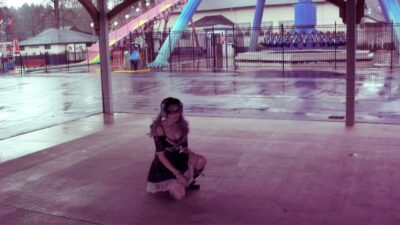
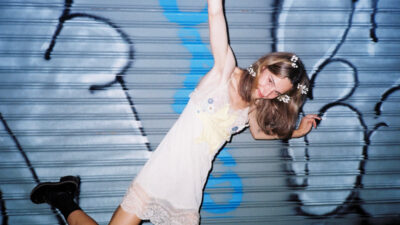
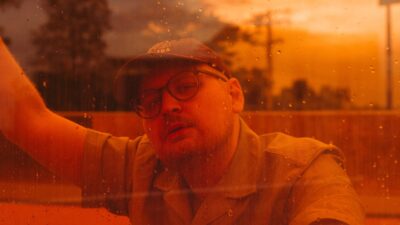
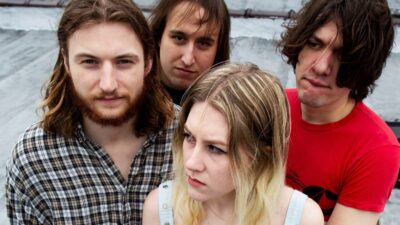
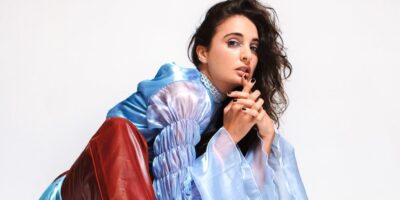
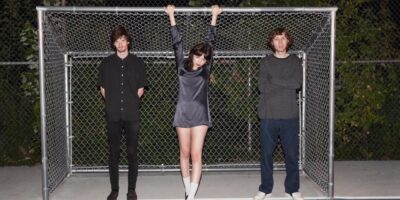

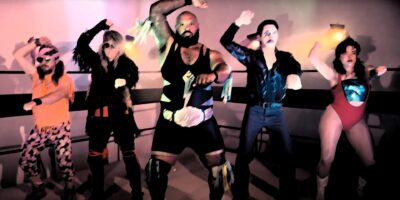
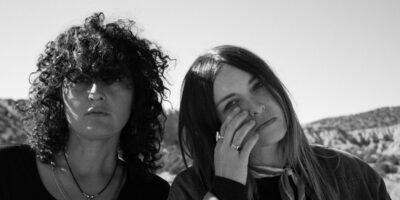
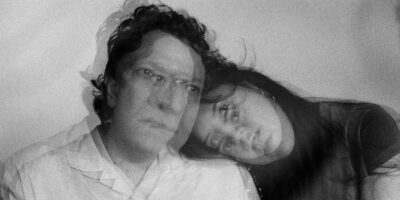




Comments